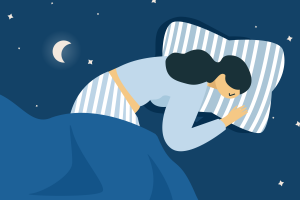Questions you may have about sleep.
Questions you may have about sleep.
What are your thoughts on sleeping in at the weekend?
- When we have genuinely not had enough sleep during the week and are really tired, we need to make that sleep up at the weekend. This seems reasonable, kind and healthy.
- But the healthiest sleep is the most regular sleep and having a very long lie-in at the weekend will break that healthy routine required for easy, deep, healthy sleep
To compromise try to incorporate the following guidelines:
- If you’re going to have a lie-in, just do it on Saturday morning and don’t make it too long
- Or have a short lie-in (not more than 2 hours and not later than 9.30 or 10.00) on both mornings
- OR if your normal waking time is very early (before 6am) it would seem reasonable to sleep till 8 or 9 on one or both mornings (I am making those times up, based on common sense and general understanding of both sleep and humans!)
- If you wake up, as is likely, at your useful alarm time, open your curtains before going back to bed
- Instead of a lie-in, you could have an early-mid afternoon nap (not later than 5pm and not longer than an hour)
- Try to go to bed a bit earlier so you get sleep then (though you probably won’t be able to go to sleep much earlier unless you are very tired)
- If you want to lie in for the luxurious feeling of not needing to get up, could you read (or similar) in bed with the curtains open so you are awake and daylight is helping your brain be wakeful?
The same applies to holidays but there’s more flexibility here as you have longer to get back into the swing of things. I suggest these guidelines:
- You could have 3-4 days at the start when you catch up on your sleep, followed by a regular sleep and wake time which gives you 8 hours a night
- Around 5 days before you go back to your work routine, start to shift your sleep/wake times towards what you’ll be doing then
- Focus on keeping it regular
Is it possible to sleep too much?
Yes. There are three aspects to this.
If you sleep really late some mornings, your brain won’t know what to expect and you’ll be likely to struggle to fall asleep at the necessary time next night.
Secondly, there’s the fact that there are a few conditions that are characterised by excessive sleepiness, often including falling asleep during the day. If you think this applies to you, it’s definitely worth checking with a doctor that there isn’t something that requires treatment.
However, note that when we’re ill – for example, with any kind of virus or minor illness – sleep is really important and it’s completely normal to want to sleep a lot. In fact, sleeping is then the best way to help your body heal itself. So, if you’re unwell, don’t fight sleep. But if your need to sleep doesn’t seem to be a side effect of a virus or other illness that you’re aware of, do check with a doctor.
If I have a bad dream and cannot get back to sleep, what can I do?
- Be reassured that even though bad dreams are horrible they are not harmful – and are actually helpful for processing fears. They also don’t mean anything specific. They don’t mean there’s something wrong with him in any way.
- We often have phases of bad dreams, especially when we are anxious.
- And, if you feel distressed, it’s OK to get up and read a funny or light book or draw a picture or something (anything other than going on a screen).
What if I find it too hard to put aside my screen?
It could help to do some research about how this works, that way you do not need to take anyone’s word for it. Have a chat with your folks or who you live with about a strategy to help.
There is an understanding that you do know that turning off screens helps before bedtime but not always easy to do with pressures of friends online.
In lockdown has there been an increase in crazy dreams?
Indeed, many people have reported more “crazy dreams”. This could be because:
- People may be expecting more crazy dreams and so noticing them
- People may (therefore) be talking about their dreams more and so others are then relating their “crazy” dreams
- People may be waking more (sleeping more lightly) and therefore being more aware of their dreams
- People may actually be having more “crazy” dreams!
We just don’t know. But it’s reasonable to guess that in times of stress our dreams might be wilder.
Check out this link to an NHS app to help with sleep. CLICK HERE.

